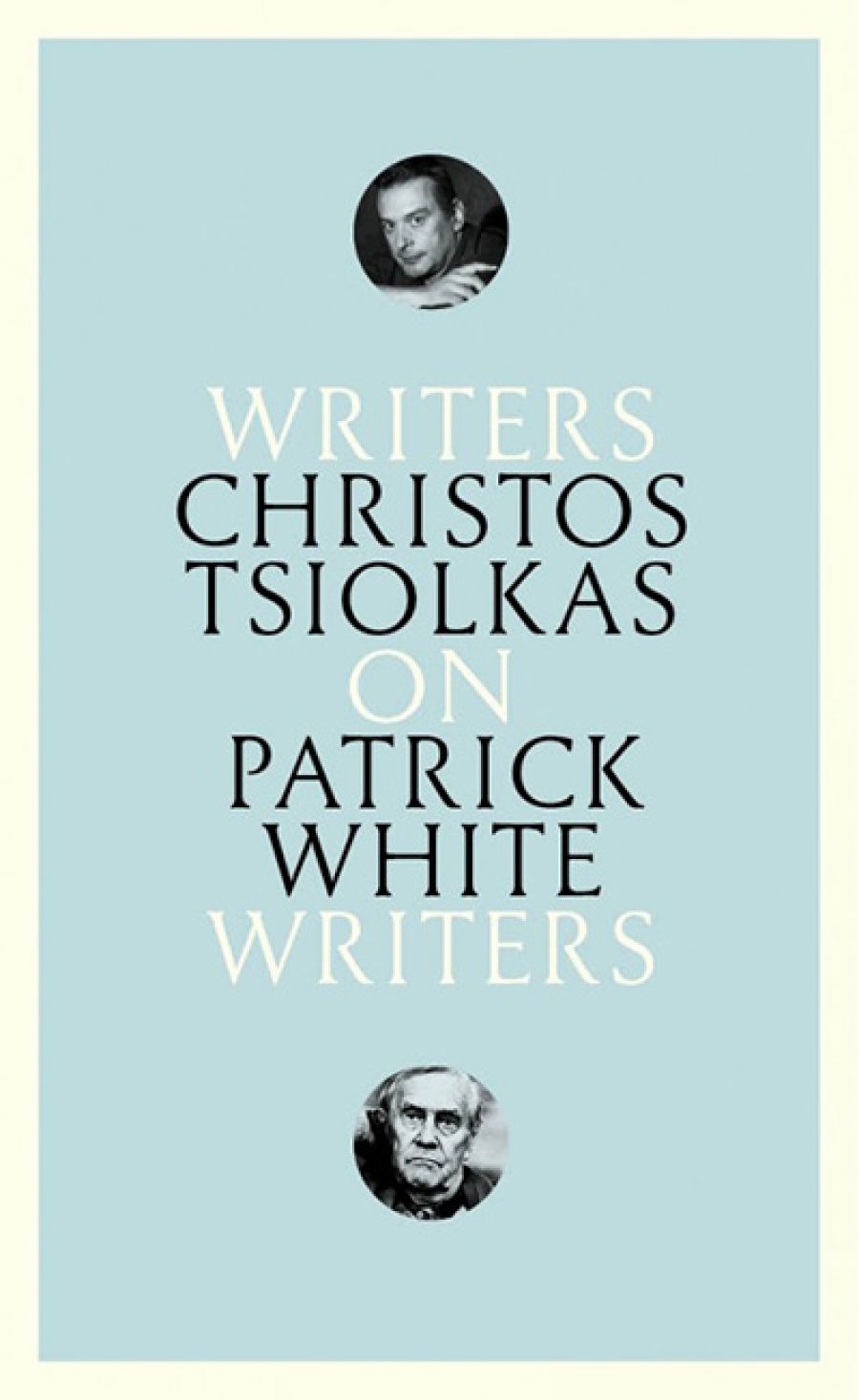
- Free Article: No
- Contents Category: Literary Studies
- Custom Article Title: Barnaby Smith reviews 'On Patrick White: Writers on writers' by Christos Tsiolkas
- Custom Highlight Text:
The Western world was well into the swing of our proverbial digital age when Patrick White passed away at his home on Martin Road in Centennial Park at the age of seventy-eight in 1990. Yet, as Christos Tsiolkas suggests at the outset of this taut and lively meditation on Australia’s greatest novelist, Patrick White is often ...
- Book 1 Title: On Patrick White
- Book 1 Subtitle: Writers on writers
- Book 1 Biblio: Black Inc., $17.99 hb, 96 pp, 9781863959797
It is also ingenious. Tsiolkas makes the compelling case for White as Australia’s first and most profound writer of the migrant experience. Tsiolkas recognises the audacity of this claim, but goes on to argue convincingly that the impact of Lascaris – like Tsiolkas a Greek-Australian – on White’s life and spirituality makes it valid. White, this book argues, was fascinated by Lascaris’s Greek Orthodox faith, which ‘reifies the seer, the hermit, and the seeker’. This consolidated White’s allegiance with the outcast, the outsider, the solitary pilgrim. Furthermore, Lascaris himself became a migrant in an entirely new country and culture when the pair moved permanently to Australia in 1948. ‘White took on an understanding,’ writes Tsiolkas, ‘of exile and of spirituality that was bestowed upon him by his lover.’
And there is more to White’s status as great sympathiser with the migrant. Tsiolkas rejoices in White’s unrivalled capacity to write authentically from a range of perspectives, to ‘transcend the bounds of identity’. From The Aunt’s Story (1948) onwards, he wrote as Aborigine, Jew, woman, and more, outsiders all, exhibiting a compassion and empathy, not to say astounding literary skill, that allowed him to reflect the alienation of the migrant experience with his peculiar brand of psycho-poetic electricity. And this too is down to Lascaris:
I think what initiates this great audacity – this ability to imagine and speak in so many voices, from within so many experiences – is the pledging of his life to Manolis Lascaris, refracting his own experiences of exile and of being an outsider through those of his immigrant lover; and discovering, also through Lascaris, a spiritual language with which to communicate.
Interestingly, it is The Tree of Man that Tsiolkas identifies as ‘the first great migrant story in our literary culture’; regarding the Englishness of its main characters, Stan and Amy Parker, as inconsequential. The novel is a ‘folk tale’, a ‘genesis story’ that ‘unites migrant cultures across the world’. This is a relatively unexplored reading of this text, and a distinctly contemporary one.
 Patrick WhiteIt is to Tsiolkas’s credit that he is not entirely convinced by all of White’s books. He describes The Living and the Dead (1941) as ‘unremarkable’, and suggests that the much-loved Riders in the Chariot (1961) suffers from its attempts to deal with both the Holocaust and colonialism in one novel, and its attempts to draw a connection between the two. Voss (1957), meanwhile, provokes an uneasy response in Tsiolkas in its ambitions toward proposing an Australian ‘foundational myth’ by depicting the psychological and physical journeys of two white Europeans without any central Aboriginal component or character.
Patrick WhiteIt is to Tsiolkas’s credit that he is not entirely convinced by all of White’s books. He describes The Living and the Dead (1941) as ‘unremarkable’, and suggests that the much-loved Riders in the Chariot (1961) suffers from its attempts to deal with both the Holocaust and colonialism in one novel, and its attempts to draw a connection between the two. Voss (1957), meanwhile, provokes an uneasy response in Tsiolkas in its ambitions toward proposing an Australian ‘foundational myth’ by depicting the psychological and physical journeys of two white Europeans without any central Aboriginal component or character.
Unsurprisingly, Tsiolkas exhibits a pleasing turn of phrase in his critical writing. In particular, he has an endearing habit of describing White’s books in musical terms: The Solid Mandala is a ‘deliciously exquisite song’; The Eye of the Storm is made up of ‘various operatic arias’; The Twyborn Affair is a ‘jubilant dance of sentences’. We might add that Tsiolkas has, in his contemporisation of an author whose legacy drifts in and out of the public eye and our collective psyche, created his own melodic paean to a man who never forgot that we were, and perhaps remain, as he puts it, ‘a migrant and mongrel nation forging our own culture and our own language’.


Comments powered by CComment